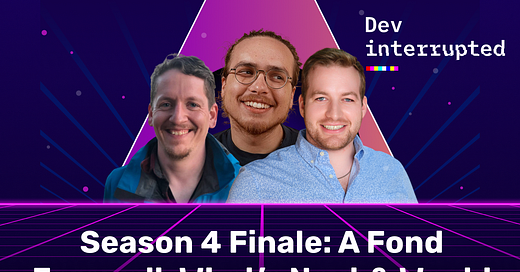Season 4 Finale: A Fond Farewell, What’s Next, & Would You Rather?
BONUS: Grandma needs to understand technical debt, and why toddlers can write unit tests.
It's the end of an era on Dev Interrupted as we say farewell to host
and welcome a fresh voice, Andrew Zigler!Join us for a nostalgic trip down memory lane as Conor revisits his favorite interviews and moments from Season 4 and earlier, including discussions on chaos engineering, technical debt, and the human side of managing software engineers. He shares memorable stories from guests like Charity Majors, Rob Zuber, Kelly Vaughn, and many more who have made an impact on the engineering leadership community.
But it’s not all bittersweet. Get an exclusive sneak peek at the exciting changes coming to Dev Interrupted in 2025. Expect the show to dive into more research and data, explore new formats, and even hit the road with live events.
But before we get there, you don’t want to miss this special episode filled with laughter, reflection, and a surprise holiday-themed game of “Would You Rather?”
As we look back on a year of growth and forward to a season of innovation, we’re grateful for the 18,000+ strong community of engineering and software leaders who make this all possible. Here’s to more productive “interruptions” and candid conversations in the new year, one conversation at a time.
Curious about this issue’s subtitle? Learn why Grandma should understand technical debt and how toddlers might be natural-born unit testers in this episode’s round of “Would You Rather?”
The team is taking off the holidays but we’ll see you back here on January 7th for the start of Season 5!
"Would you rather have to explain the concept of technical debt to your grandparents, or teach a toddler how to write a unit test?" — Ben Lloyd Pearson
The Download
The Download is your flurry of favorite things, like engineering trends or snowflakes on eyelashes. ❄️
1. Programmers want flow, so this dev built a traffic light 🚦
Inspired by a whitepaper, a developer built a traffic light to signal when they’re in a flow state, in an attempt to curb interruptions. A top comment invited a compelling conversation:
“The easiest way to detect if a programmer is in flow is to see if they’re typing into their editor.” Does anybody else find that statement controversial?
As we and our readers know, programming is more than typing. It’s problem-solving, planning, and creating space for innovation.
Read: Programmers want flow. when programming, light turns RED
2. How protected focus time boosts engineering outcomes ⏳
Research-driven insights from
explore how computer-assisted protected (CAP) time helps engineers reclaim focus and reduce interruptions. By scheduling non-negotiable calendar blocks, teams see improvements in productivity, work-life balance, and overall job performance — an idea that ties back to last week’s discussion on late-night productivity peaks.3. 2025 is the year AI needs to pay for itself 💸
Engineering leaders are skeptical of the hype. 2025 is all about proving AI’s ROI. In his latest post, Dev Interrupted Host Dan Lines lays out the playbook: start with proven wins like PR descriptions and retro summaries, measure impact obsessively, and use those gains to fund bigger experiments. AI isn’t going anywhere, but execs want results now, not buzzwords.
Read: 2025 is the Year to Demonstrate Gen AI ROI
Predictable project delivery forecasts are the key to getting more sleep 🛌 (sponsored)
One of the most challenging, yet crucial aspects of running an effective engineering organization is providing accurate software delivery timelines. Besides helping you avoid the tossing and turning associated with the prospect of missed deadlines, communicating correct timelines helps the other parts of the business function more consistently and efficiently.
The latest LinearB enhancement, an all-new Project Forecasting dashboard, leverages the power of automatically generated insights, saveable project filters, and Monte Carlo predictive modeling to help your team commit to delivery dates with confidence.
Read: Project Forecasting: Your Delivery Timeline Crystal Ball
4. Why synchronized time off beats burnout ⏱️
Could company-wide holidays be the key to preventing developer burnout? Watch leaders from DataStax, Stack Overflow, and Reprise share how synchronized time off is not just a perk, but a performance booster for their teams.











It's been such a pleasure being part of Dev Interrupted's story the past ~4 years, and I can't wait to see what the next chapter looks like!
The community and the podcast are in good hands with Dan, Ben, and Andrew - thanks for having me back on to say goodbye to all of Dev Interrupted's amazing listeners!